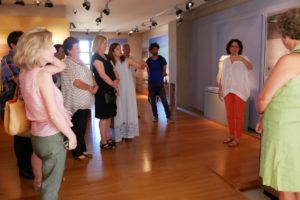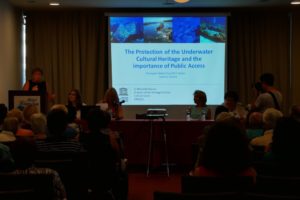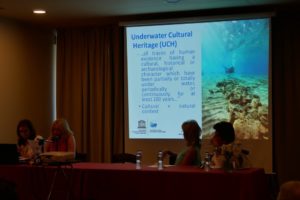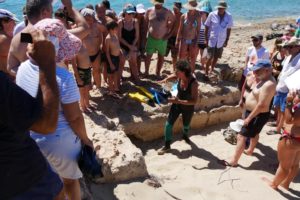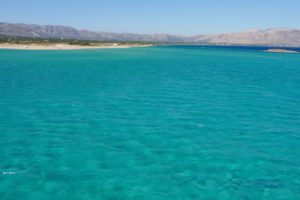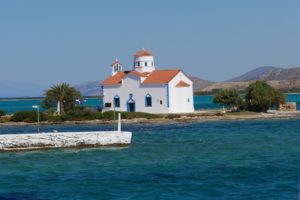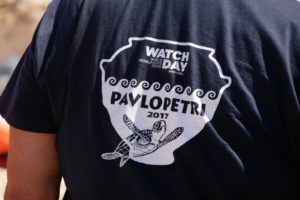Pavlopetri Watch Day 2017: A success for the community and inspiration for the future
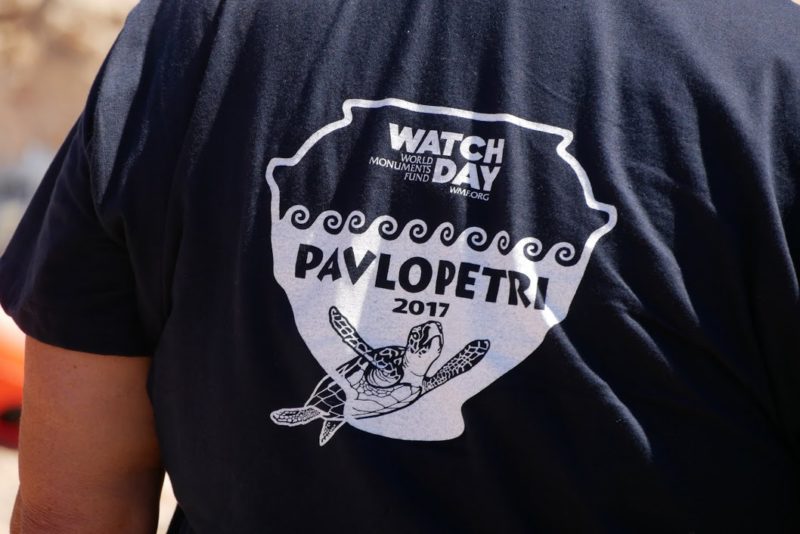
Date: 8/11/17
Written by: Hannah Clevenger
When all the elements came together, the second annual Pavlopetri Watch Day (July 28-30) proved a tremendous success. Built on programming from the first annual Watch Day in 2016, the Greek chapter of ARCH expanded some elements and added others, making this year’s event even more stimulating and fun. People from different parts of world with an interest in history and cultural heritage preservation met at Pavlopetri to learn and discuss the next steps for the site’s future.
The weekend was designed to highlight the broad range of cultural and biological resources that make this area both unique and fragile, and to encourage attendees of all backgrounds to help promote and protect the site in the future.
On Friday the 28th, the Ministry of Culture of Lakonia presented a tour of the newly-opened Archeological Museum of Neapolis for Governor of the Peloponnese Petros Tatoulis, Dr. Mechtild Rössler, Director of the Division of Heritage at UNESCO and the UNESCO World Heritage Center, Dr. Elena Korka, Director General of Antiquities and Cultural Heritage at the Ministry of Culture, representatives of the Ministry of Culture, government officials and local supporters. Later, the honored guests enjoyed dinner at Moreas Restaurant in the historic city of Neapolis.
A member site of the World Monuments Fund’s Watch List program, Pavlopetri’s Watch Day was jointly funded by the WMF and the Greek chapter of ARCH. The weekend-long event was dedicated to spotlighting Pavlopetri in different ways, including family-oriented activities, lectures, and a photo exhibition dedicated to the surrounding region. All of these activities were planned to highlight the area’s ecological and cultural diversity (see below for beautiful views of Pavolpetri and the surrounding area). In addition to the Watch List recognition, Pavlopetri’s Vatika Bay has been listed as a “Hope Spot” by Mission Blue, a prestigious international organization dedicated to ocean advocacy and protecting marine diversity.
On Saturday morning, attendees were able to experience this diversity and beauty first-hand through snorkeling tours over the Pavlopetri archaeological site guided by Despoina Koutsoumpa of the Ministry of Culture. The archaeological site itself is easily accessible, as it lies in shallow clear waters.
Saturday evening, Dr. Mechtild Rössler, Dr. Elena Korka, and Dr. Angeliki Simosi, Director of the Ephorate of Underwater Antiquities at the Greek Ministry of Culture gave presentations at the Limira Mare Hotel. Dr. Rössler, the keynote speaker, presented her speech entitled “The UNESCO Convention on the Protection of the Underwater Cultural Heritage: Beneficial Provisions and Best Practice”. The presentations were attended by a packed house of professionals, community members, and tourists. Topics discussed included the unique challenges and rewards of protecting and learning about underwater cultural heritage.
Early Sunday morning, walkers and runners assembled at the Liminaki fishing harbor for a Fun Walk/Run along the beach road past Pavlopetri and a number of loggerhead turtle nests. Later on Sunday, on the beautiful island of Elafonisos, Koutsoumpa led games for children and Stavros Deligiannides spoke on “Pavlopetri: A Virtual Representation.”
Barbara Euser, President of the Greek chapter of ARCH, later reflected on the impact that this weekend had on the long-term goals for Pavlopetri:
“There seems to be a lot of goodwill and a consensus that things should move forward with the preparation of a management plan for Pavlopetri. Publication of the coordinates of the locations of the buoys around Pavlopetri in the Government Gazette will be an important step. The assurances from Dr. Korka and Dr. Simosi that Greece is moving towards ratifying UNESCO’s 2001 Convention on the Protection of Underwater Cultural Heritage are very welcome. This would be a huge step forward for the Greek government. Getting Gov. Tatoulis, MP Arachovitis, Dr. Rössler, Dr. Korka, Dr. Pandou, Dr. Simosi, and others from the Ministry of Culture, and other local officials to all come together to talk about Pavlopetri with local citizens was an extremely positive development.”
All in all, this very successful event is a testimony to all the efforts and the dedication of the Greek chapter of ARCH, and all the other groups and individuals who came together to make the weekend possible. All of us at ARCH are already looking forward to the next year’s event celebrating Pavlopetri; we would love to hear from friends who joined us this year: what can we do to make the event even better?
It will also be exciting for us, to see which organizations will be chosen for the Monuments Watch List for the next two years. For any interested organizations, we would be glad to answer any questions about Pavlopetri’s nomination and selection process, and ARCH’s participation in the program.
Learn more about ARCH’s work in Pavlopetri here.
All photos are courtesy of Dimitris Delakovias.
- Honored guests attending a tour of the local archeological museum.
- Guests attend a presentation and panel discussion on underwater heritage preservation.
- Explaining the details of underwater cultural heritage during the panel discussion.
- Families gather to learn about the archaeological history of the area on Sunday.
- The beautiful turquoise waters of Vatika Bay.
- A small church that sits near the Pavlopetri underwater archeological site.
- Pavlopetri’s Watch Day commemorative tshirt.

